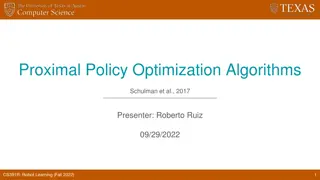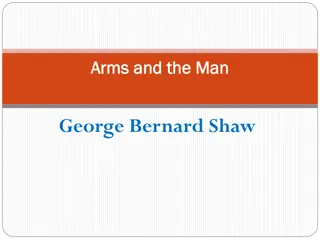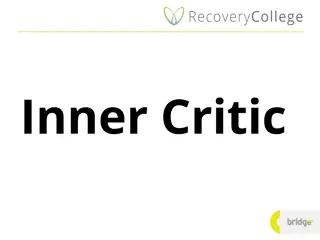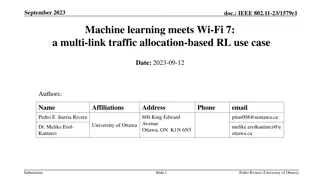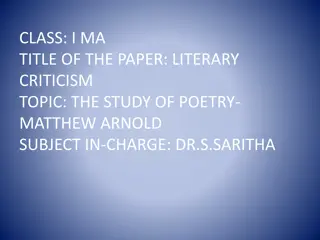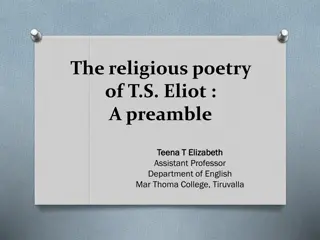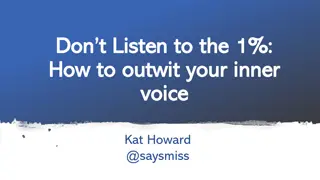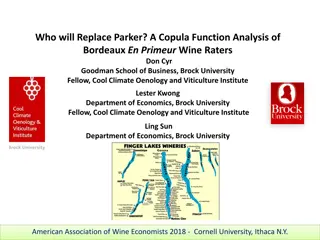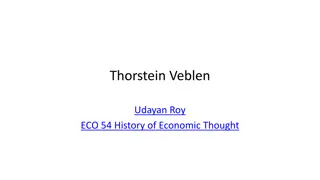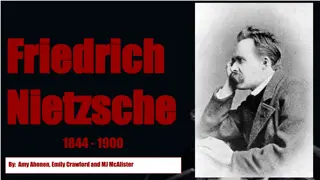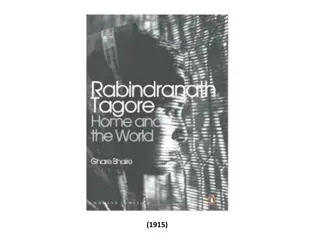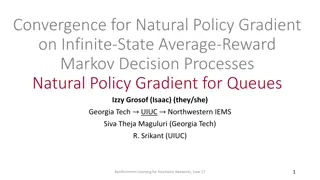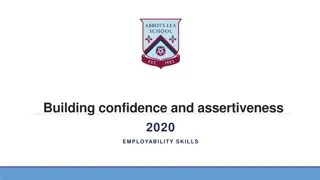Machine Learning Meets Wi-Fi 7: Multi-Link Traffic Allocation-Based RL Use Case
This presentation by Pedro Riviera from the University of Ottawa explores the intersection of machine learning and Wi-Fi technology, specifically focusing on the application of Multi-Headed Recurrent Soft-Actor Critic for traffic allocation in IEEE 802.11 networks. The content delves into the evolut
1 views • 23 slides
Advanced Reinforcement Learning for Autonomous Robots
Cutting-edge research in the field of reinforcement learning for autonomous robots, focusing on Proximal Policy Optimization Algorithms, motivation for autonomous learning, scalability challenges, and policy gradient methods. The discussion delves into Markov Decision Processes, Actor-Critic Algorit
6 views • 26 slides
George Bernard Shaw: Influential Playwright and Social Critic
George Bernard Shaw, an Irish playwright, social critic, and political activist, is renowned for his witty language and social criticism in works like "Arms and the Man," "Pygmalion," and "Saint Joan." Shaw's influence on British socialist theory through Fabianism and his embodiment of realism in En
0 views • 25 slides
Understanding Your Inner Critic and Building Self-Compassion
Explore the concept of the Inner Critic, its impact on self-perception, and practical strategies to develop self-compassion. Learn to identify critical self-talk, differentiate between the inner critic and your true self, and cultivate a positive internal dialogue to counter negativity effectively.
0 views • 9 slides
Machine Learning Meets Wi-Fi 7: Multi-Link Traffic Allocation-Based RL Use Case
The paper discusses the application of a Reinforcement Learning algorithm, Multi-Headed Recurrent Soft-Actor Critic, for optimizing traffic allocation in IEEE 802.11be Multi-Link Operation networks. This work aims to enhance throughput and reduce latency in MLO-capable devices by distributing incomi
0 views • 18 slides
Matthew Arnold's Literary Criticism: The Study of Poetry
Explore Matthew Arnold's approach to literary criticism focusing on the study of poetry. Arnold's work as a critic of literature, society, and religion is discussed, emphasizing his three estimates of poetry - the Real Estimate, the Historic Estimate, and the Personal Estimate. The Real Estimate hig
0 views • 9 slides
Exploring the Religious Poetry of T.S. Eliot: A Preamble
Thomas Stearns Eliot, a renowned American-English poet, playwright, and literary critic, is celebrated for revitalizing English poetry through his innovative style and critical essays. Influenced by various sources like Indian thought, F.H. Bradley's philosophy, and Christianity, Eliot's work can be
1 views • 21 slides
Overcoming Imposter Syndrome: How to Outwit Your Inner Voice
Discover how to outsmart your inner critic and tackle imposter syndrome effectively. Learn about the common features of imposter syndrome and ways to take action to be braver and build integrity. Challenge perfectionism, self-doubt, and limiting beliefs to shape your own success story.
0 views • 4 slides
Analysis of Bordeaux En Primeur Wine Ratings with Copula Functions
Exploring the influence of wine critic ratings, particularly Robert Parker Jr., on Bordeaux en primeur wine pricing using copula functions. This study delves into the impact of barrel ratings on en primeur prices, showcasing the significance of critics in the wine market. The Bordeaux en primeur pro
0 views • 40 slides
Charles Dickens: A Literary Icon of the Victorian Era
Charles Dickens, the renowned English writer of the 19th century, was a prolific author whose works vividly portrayed the social injustices and harsh realities of the Industrial Revolution. Through timeless classics like "Oliver Twist" and "Great Expectations," Dickens highlighted issues such as pov
0 views • 16 slides
Matthew Arnold's Impact on Literary Criticism and Poetry Evaluation
Matthew Arnold, a prominent Victorian poet and critic, revolutionized literary criticism by emphasizing the importance of knowing and promoting the best ideas in the world through critical evaluation. He introduced scientific objectivity to criticism and influenced a generation of critics. Arnold sa
0 views • 25 slides
Thorstein Veblen: Critic of Capitalism and Founder of American Institutionalism
Thorstein Veblen, a key figure in the history of economic thought, criticized capitalism for its rough and monopolistic nature. He founded the American Institutionalism School and challenged neoclassical economics' view of rational consumer behavior and business motivations. Veblen's analysis focuse
0 views • 23 slides
Friedrich Nietzsche - Philosopher and Thinker Extraordinaire
Friedrich Nietzsche, a renowned German philosopher, cultural critic, and essayist, challenged traditional Western morality and Christian beliefs. He advocated for personal reflection in philosophy, rejected societal norms, and introduced existentialist ideas that emphasized individual freedom and re
0 views • 10 slides
Rabindranath Tagore: A Literary Pioneer and Social Critic
Rabindranath Tagore, a prominent figure in Indian literature and culture, was the first non-European to win the Nobel Prize in Literature in 1913. He bridged the gap between Indian and Western cultures through his works, particularly evident in "The Home and the World." Tagore's involvement in the S
0 views • 17 slides
Siegfried Sassoon: War Poet and Satirical Critic
Siegfried Sassoon, a British war poet and soldier, was a prominent figure in World War One. He critiqued the attitudes of senior officers through his realistic and satirical war poetry. "Base Details" by Sassoon reflects on the disconnect between frontline soldiers and base Majors. The poem highligh
0 views • 7 slides
Reinforcement Learning for Queueing Systems
Natural Policy Gradient is explored as an algorithm for optimizing Markov Decision Processes in queueing systems with unknown parameters. The challenges of unknown system dynamics and policy optimization are addressed through reinforcement learning techniques such as Actor-critic and Trust Region Po
0 views • 20 slides
Enhancing Confidence and Assertiveness in Employability Skills
Understanding the concepts of confidence and assertiveness is crucial in developing employability skills. Assertiveness involves standing up for oneself while respecting others. Tips for gaining confidence include visualization, self-affirmation, facing fears daily, and challenging your inner critic
0 views • 7 slides

